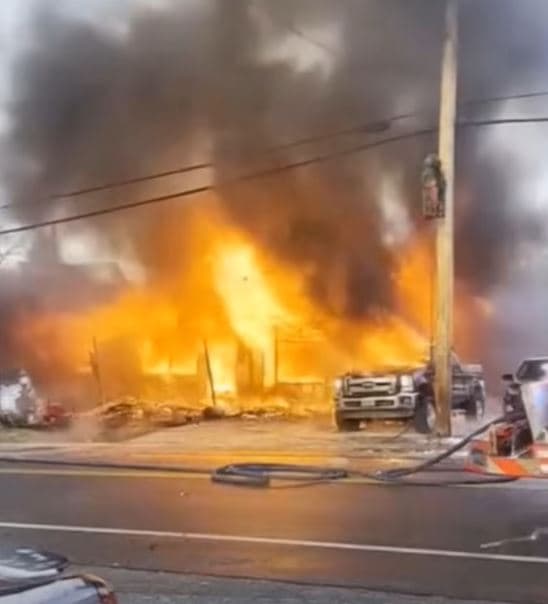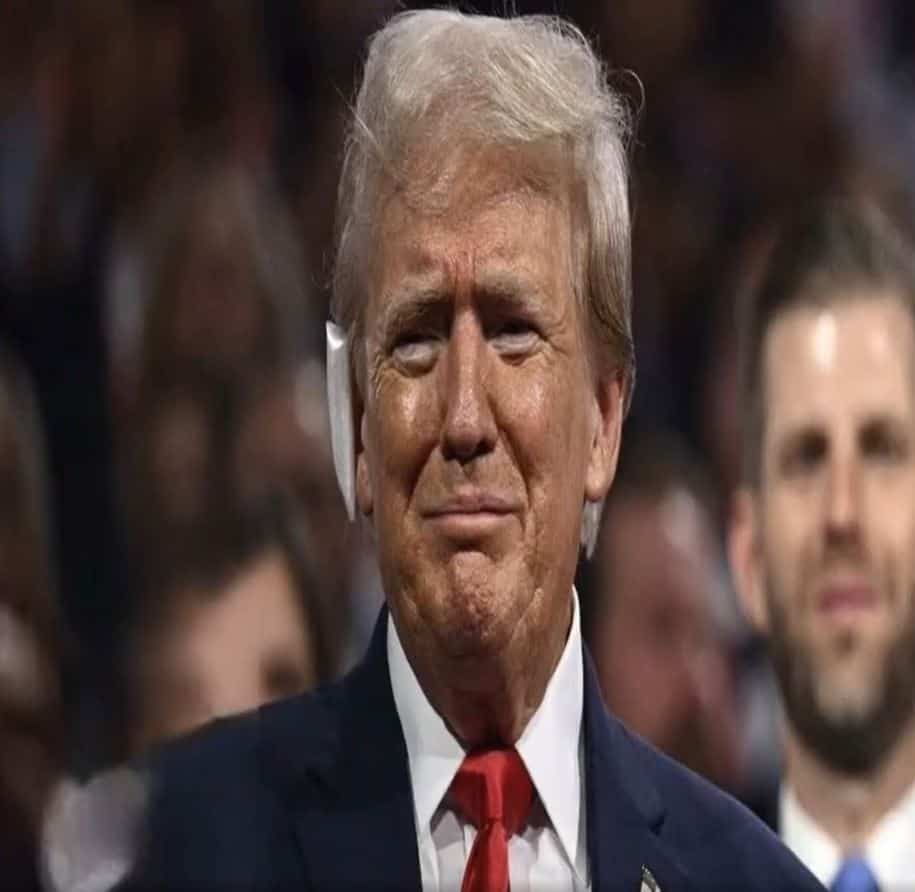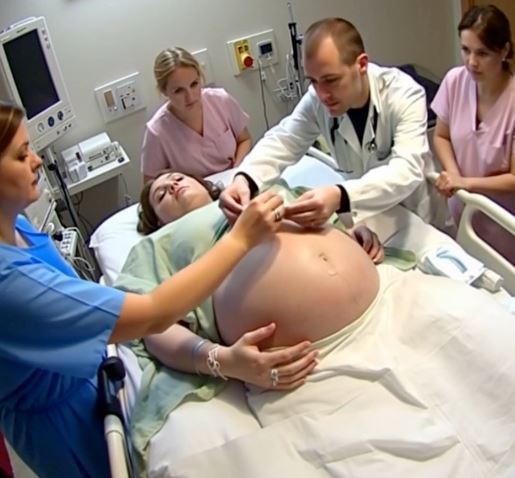“Stop! Don’t Close It — She’s Still Alive!” The Moment That Shattered a Billionaire’s Funeral and Uncovered a Hidden Truth
Snow had been falling for hours—fat flakes drifting down like sorrow in the night. The city was silent under a white blanket, streetlamps glowing weak halos in the gloom. Fourteen-year-old Marcus Reed trudged through the slush, his threadbare jacket doing little to keep out the cold. Hunger gnawed at him, and his shoes were soaked. But he kept walking — staying in motion was safer than stopping. He’d lived on the margins for years, orphaned and unclaimed, surviving on scraps, odd jobs, and luck. Tonight was proving weak on all fronts.
Across the street loomed a mansion — one of those old colonial types with columns and stone steps, all lit up in mourning. A quiet cluster of cars, blacked-out windows, heavy silhouettes. Mourners in dark coats drifted in and out, camera flashes going off in respectful bursts.
Marcus paused, watching shadows move behind high windows. The name “Whitman” had been whispered in the neighborhood — the Whitmans, a banking dynasty whose daughter, Aurelia Whitman, had died in a car accident three days earlier. It was the only reason cars like those and people like that were here.
He hesitated. But when the solid oak doors parted, and the lights inside drew him like a magnet, he stepped forward.
“Stop! Don’t Close It!”
Inside, heavy floral arrangements and polished floors greeted him. A hush had fallen over the crowd. A velvet-draped coffin sat at the front of the chamber. The pastor’s voice, solemn and slow, echoed off the high ceiling. As he walked up the aisle, his boots scuffing, heads turned. The newspaper reporters in the back cameras poised. Security guards stiff along the walls.
Marcus’s palms were clammy. He cleared his throat.
“Stop! Don’t close it! She’s still alive!”
The chamber froze. The pastor’s voice caught. Guests gasped. The guards lurched forward — but one hand raised silently stopped them.
Samuel Whitman, Aurelia’s father, stood. He was tall, silver-haired, his dark suit immaculate. His eyes, hollow and red-rimmed, locked on Marcus.
“Let him speak,” Samuel commanded with a low, sharp tone.
Marcus drew himself straight, voice trembling but resolute.
“Sir… I work part-time at the city morgue. Last night, I was told to help — I saw your daughter, Aurelia. She was breathing. Weak, yes — but breathing. I begged them not to pronounce her dead. They dismissed me — because I’m just a street kid.”
He swallowed, voice cracking. “But I saw the scar — the crescent on her left shoulder. I know what I saw.”
Samuel’s face blanched. That scar — only he and Aurelia had ever known of it. He turned to the funeral director. “Open the coffin. Now.”
The director stammered objections about protocol. Guards gripped their batons. But Samuel’s voice boomed: “I will not bury my child today under a lie!”
The lid creaked. A hush swallowed the room.
When the coffin lid swung open, cold air rushed out, floral scent mingling with wax. Marcus’s heart hammered. The crowd leaned in. Cameras flashed. Inside lay Aurelia — pale, pallid, lips blue, hands folded, eyelashes trembling. Her chest was still. Many assumed it a final stillness.
Marcus stepped forward, voice quivering: “Sir—touch her arm. You’ll feel warmth.”
Samuel knelt, placing his hand on her wrist. His eyes filled. A tremor ran through him. He looked back at the crowd. “She’s alive.”
A ripple of astonishment spread. The pastor dropped his script. Guards blinked. Reporters scrambled. One guard tried to pull Marcus back. Samuel stepped forward. “Let him be. He is my witness.” In that silent moment, Aurelia stirred. A faint cough. A breath. A flutter of eyelids. Someone cried out.
The room erupted — people clambering, doctors running forward, blankets bursting, shock and confusion everywhere.
Aurelia was rushed to the hospital behind the mansion. The room was sterile, beeping machines. Masks. Nurses giving oxygen. Samuel at her side, wiping her hair.
Marcus stood at the threshold, watched and waited.
Inside, the truth unraveled in whispers. The coroner’s report had been rushed, based on superficial evidence and medical “protocol.” The car crash had left her in critical condition — not death. The scar, the shallow but present pulse — nobody else looked close enough, or cared.
The morgue staff, when confronted, issued apologies and excuses: flawed equipment, miscommunication, pressure from higher ups to “close the case.” A few faces registered dread at seeing Marcus testify.
Marcus’s past life — petty theft, sleeping in alleys — was dredged up by some media as “a boy with no credibility.” But Samuel, standing guard, shut them down.
“I heard him speak,” Samuel told reporters. “He saw what I could not. And he saved my daughter’s life.”
Public opinion shifted: some called Marcus a hero; others still doubted. But Aurelia’s gradual recovery became proof enough.
As Aurelia lay in recovery, Samuel invited Marcus to stay at the mansion under guard until the media frenzy died. He gave him a small room, decent meals. The staff respected Marcus’s presence — timid at first, then warm. Aurelia’s siblings blinked with confusion and curiosity. Samuel’s old friends came and went, some offering respect, others cold stares.
In private moments, Samuel thanked Marcus again and again, eyes filled with gratitude.
“You saved her life,” he’d whisper. “You saved my family.”
Marcus, who had lived nights hungry and invisible, found himself invited to dinner tables, asked his opinion, given scraps of kindness he never thought he’d deserve.
But shadows lingered. In terse phone calls, Samuel’s business associates showed up demanding control in the hospital. The insurance companies resisted switching from coroner’s certified death to “resuscitated survivor.” Some whispered lawsuits and public scandal.
Marcus knew: the miracle he delivered made him a guardian, but also a target.
One evening, unable to sleep, Marcus wandered the mansion corridors. Drawn by curiosity and unease, he slipped into the library’s private office — a room lined with books, secrets, and locked drawers. One drawer, slightly ajar, caught his eye. Inside were files — hospital records, a blacked-out name, a “Project Whitman Trust,” and a computer tablet showing suppressed cause-of-death reports.
He tapped a folder: “Aurelia – Postmortem Revision” Inside, he found autopsy photos, lung markings inconsistent with death, and memos from the original pathologist requesting a re-check that was never done.
He gasped. Someone deliberately misclassified her death. Someone in power had hidden the truth.
Before he could react, footsteps came. Samuel appeared in the doorframe.
“Marcus,” Samuel said quietly. “Yes. I knew.”
Marcus turned, panic sharp in his throat. “You did?”
Samuel nodded, pulling out an envelope. “I suspected foul play. The crash scene, the witnesses, the hush orders… but I needed proof. Thank you for forcing their hands.”
Marcus’s head spun. “But who would—why?”
Samuel’s face hardened. “Power, inheritance… the Whitmans have enemies. I’ll protect her now. You’re family.”
Once Aurelia was moved to a private recovery villa, Samuel arranged a trip to the crash site. He wanted Marcus to see with his own eyes what no one else should forget. They arrived just after dawn, fog swirling around the twisted car shell. Markers and police tape long gone. The mangled hood, glass shards, skid marks.
Samuel knelt. “She should have died there.”
Marcus bent closer and found something etched faintly in the door trim — a set of initials: R.P.
He stared. Samuel followed his gaze.
“Rebecca Pritchard,” Samuel whispered — name of his business rival, family enemy.
Marcus’s mind reeled. That was the one name whispered in funding battles, in shady acquisitions. Could she have arranged the crash?
Samuel placed a hand on Marcus’s arm. “We fight. Legally. Publicly. Truth will come out.”
Aurelia, still weak but lucid, touched his shoulder. “You saved me.”
Marcus swallowed. “I did. But you saved me, too.”
Back at the mansion, Samuel presented Marcus with another envelope. He urged him to open it now.
Inside: a single sheet of paper, elegant script:
To my dearest Aurelia,
If you read this someday, I want you to know your life mattered — even beyond what your last moments should have been. They will come for you. Protect this boy. He was more than a witness. He was meant to be our family.
— R.P.
Marcus’s heart froze. The initials matched the ones at the crash site. Rebecca Pritchard was not just a rival — she was someone who wanted Aurelia gone.
Samuel’s voice cracked: “She tried to bury us in shame and lies. But you brought light.”
As cameras flashed outside the window, Marcus clasped Aurelia’s hand. He looked into Samuel’s eyes, silent promise passing between them. Because the coffin should never have closed. And because the fight for truth was only just beginning.



